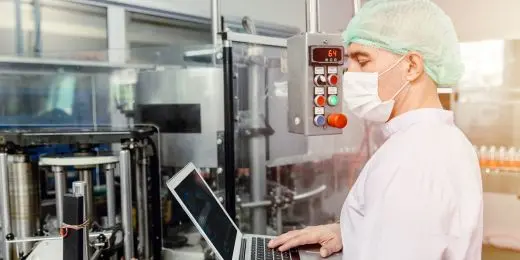What is ISO 22000:2018?
ISO 22000:2018 is an internationally recognized standard that provides a practical framework for implementing a food safety management system. It can be used by any organization in the food supply chain, from farmers and food producers to retailers and food services. The standard covers a wide range of food safety, from handling raw materials to the final product. It also includes requirements for managing food safety hazards and risk mitigation. By adhering to the requirements of ISO 22000:2018, organizations can help ensure that their food is safe to eat and that they are taking steps to prevent foodborne illness. It can protect consumers and build confidence in the food industry.
ISO 22000:2018 combines and supplements the fundamental elements of ISO 9001 and HACCP to provide a suitable framework for developing, implementing, monitoring, and continuous improvement of a documented Food Safety Management System (FSMS) in the context of an organization’s overall business risks.
ISO 22000 vs FSSC 2200 vs BRC
One of the most frequently asked questions about ISO 22000 is how different it is from two other renowned food safety standards: FSSC 22000 (Food Safety System Certification) and BRC, now called BRCGS (British Retail Consortium Global Standard for Food Safety). Refer to the table below in order to spot the main differences between ISO 22000, FSSC 22000, and BRC:
ISO 22000 |
FSSC 22000 |
BRC/BRCGS |
|
| Certification Process | 2-stage onsite audit | 2-stage onsite audit | 1-stage onsite audit |
| Certification Approach | Combines and supplements core elements of ISO 9001 (click here to view ISO 9001 checklist) | Framework approach to implement a process-based FSMS | Prescriptive on food safety procedures and guidelines (click here to view BRC requirements) |
| Scope of Requirements | Includes PRPs (pre-requisite programs) and a HACCP-specific food safety plan | Expands ISO 22000 standard with specific requirements (click here to view additional requirements) | Includes a HACCP-specific food safety plan |
| Nonconformity (NC) Closeout / Deadline for Corrective Actions | Within 14 days | Within 30 days | Within 28 days |
| Recertification Period / Validity of Certificate | Every 3 years with surveillance audits once a year | Every 3 years with surveillance audits once a year | Every 6 or 12 months, depending on the assessed grade |
| Recognized by the Global Food Safety Initiative (GFSI) | No | Yes | Yes |
Benefits of Food Safety Certification
ISO 22000:2018 helps in improving organizations’ food safety performance. It is a systematic way of addressing food safety issues such as unsafe food importation, foodborne illnesses, food contamination, and insufficient food security. Implementing ISO 22000 will benefit your organization with the following:
Compliance With Global Regulatory Requirements
ISO 22000 sets internationally-recognized food safety standards for controlling food hazards. It helps the organization to grow globally with recognized food safety policies and prevents costly ramifications, such as fines, penalties, product recalls, or business shutdowns.
Promote Health and Safety Regulation
Health and safety regulation is paramount to any business. It is implemented across industries to protect and secure your consumers as well as your employees. ISO 22000 helps minimize health and safety risks such as chemical contamination, diarrhoeal diseases, food risks, and work-related incidents and injuries.
Improve Food Risk Response Rate
FSMS in place helps businesses to respond immediately to any unexpected food safety issues. It diminishes the time to investigate food safety breaches which can give businesses more time to solve the problem.
Improve Business Credibility and Transparency
Business credibility relies on product expertise and customer feedback. ISO 22000 allows business to showcase their food safety management systems to ensure and deliver high-quality food products and services.
Increase Business Development and Growth
ISO 22000 helps secure business continual improvement plans on food safety systems. It is used to identify improvement needs and develop new strategies to deliver remarkable products to satisfy the consumer’s needs.
Reduce Food Safety Breach Investigation Time
Using ISO 22000 helps reduce the time necessary to investigate food safety breaches. The framework provides a systematic approach to food safety hazard management. With an FSMS, businesses can quickly identify and rectify potential food safety risks.
Customer Satisfaction and Brand Loyalty
Customers are the lifeline of any business. Customer satisfaction not only relies on product quality but also on food safety and hygiene. Implementing ISO 22000 can help companies to deliver high-quality products and services that consistently fulfill customer expectations and provide dependable and trustworthy service.
Proven Business Credentials
Organizations certified to ISO 22000 can use the certification mark to demonstrate their commitment to food safety. Verification against a worldwide accepted industry criterion reflects an organization’s commitment to quality and sustainability.
Create Your Own ISO 22000 Audit Checklist
Eliminate manual tasks and streamline your operations.
Get started for FREEWhy is ISO 22000 Important for You?
ISO 22000 provides a framework for measuring and assessing food safety risks and performance. It allows an organization to comply with industry standards related to food safety. While it is voluntary to certify for ISO 22000, it does prove to be beneficial for food producers, food manufacturers, regulators, retailers, and most importantly consumers. Below are some reasons why it is important to certify for ISO 22000:
- It provides you with a proactive, systematic, and logical approach to identifying relevant food safety hazards and risks
- Reduces and eliminates risks of foodborne illnesses
- Helps maintain compliance with food safety standards relevant to your region
- Increase efficiency, quality, and safety across the food chain
- Improves reputation and gives you a competitive edge in the industry
- Provides a greater level of assurance to customers and other stakeholders that food safety is taken seriously within the organization
To know more about the this internationally-recognized standard, take a look at this quick and easy PDF guide to the ISO 22000.
What Does ISO 22000 Require?
ISO 22000 Food Safety Management System ensures safe practices are followed within the organization. This documentation should include the following:
- An effective Prerequisite Program (PRP) to control the likelihood of introducing food contamination and an unsanitary environment.
- A Hazard Analysis and Critical Control Point (HACCP) plan to identify and control biological, chemical, and physical hazards present in food manufacturing and production.
- A documented food safety management system that monitors food safety from management and business planning down to food production, handling, and day-to-day operation.




